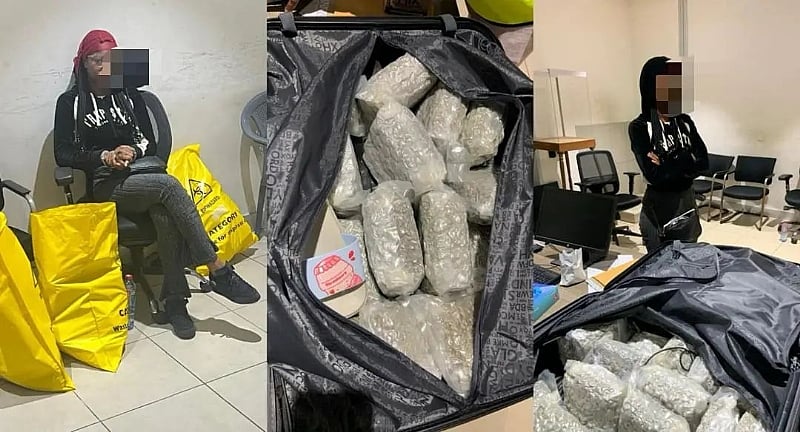The Narcotics Control Commission (NACOC) of Ghana has intensified its efforts to combat drug trafficking, resulting in a series of significant arrests at Kotoka International Airport (KIA). A recent incident involved a British female passenger attempting to smuggle a substantial quantity of cannabis out of the country on a British Airways flight bound for London Gatwick. This arrest follows closely on the heels of another major drug bust involving a British national arriving from Thailand, highlighting a concerning trend and prompting increased security measures at the airport. These successful interdictions underscore the growing sophistication of drug trafficking operations and the crucial role of international collaboration in disrupting these criminal networks.
The latest incident unfolded at KIA as the British woman prepared to board British Airways flight BA 2066. During routine security screening, authorities discovered 32 slabs of a suspicious substance concealed within her suitcase. Subsequent field testing confirmed the substance to be cannabis, with a total weight of 17.72 kilograms. The woman was immediately apprehended and transferred to NACOC headquarters for further investigation. This case mirrors a similar incident that occurred just days earlier, further emphasizing the persistent threat of drug smuggling through Ghana’s primary international airport.
The preceding case, which transpired on May 18, involved another British national arriving at KIA from Thailand via Dubai. This individual was found to be in possession of two suitcases containing a staggering 92 slabs of cannabis, weighing a total of 53.6 kilograms. The scale of this seizure suggests a well-organized and potentially lucrative drug trafficking operation. The subsequent investigation into this case led to the arrest of two alleged accomplices working within the airport itself – a customs officer and a porter from the Commercially Important Person (CIP) section. Their involvement raises serious concerns about internal corruption facilitating drug smuggling through official channels.
The arrest of airport personnel implicated in the May 18th incident highlights a critical vulnerability within the security apparatus. The alleged complicity of a customs officer and a CIP porter suggests a potential breach of security protocols and raises questions about the extent of such infiltration within the airport. This discovery underscores the need for enhanced vetting procedures for airport staff and a thorough review of existing security measures to identify and address any weaknesses that may be exploited by drug traffickers. It also necessitates ongoing training and awareness programs to reinforce the importance of ethical conduct and the severe consequences of colluding with criminal elements.
The recent surge in drug smuggling attempts through KIA points to a potentially escalating challenge for Ghanaian authorities. The involvement of foreign nationals, particularly British citizens, in these cases suggests the possibility of transnational drug trafficking networks utilizing Ghana as a transit point. This raises concerns about the potential for increased drug-related activity within the country and the associated risks of violence, corruption, and social instability. The strategic location of Ghana, coupled with its relatively porous borders, makes it a potentially attractive route for drug traffickers seeking to move illicit substances between Africa, Europe, and other parts of the world.
To effectively combat this growing threat, NACOC has intensified its collaboration with airport security, customs officials, and other law enforcement agencies. This collaborative approach aims to enhance intelligence sharing, improve detection capabilities, and strengthen interdiction efforts. Furthermore, fostering international cooperation with law enforcement agencies in other countries, particularly those identified as source or destination points for drug trafficking, is crucial. This includes sharing information, coordinating operations, and providing mutual legal assistance to dismantle transnational drug trafficking networks. Strengthening border control measures, investing in advanced detection technologies, and conducting regular security assessments are also essential to minimizing the risk of drug smuggling through KIA and other points of entry. The recent arrests, while concerning, demonstrate NACOC’s commitment to disrupting drug trafficking operations and safeguarding Ghana’s borders.


